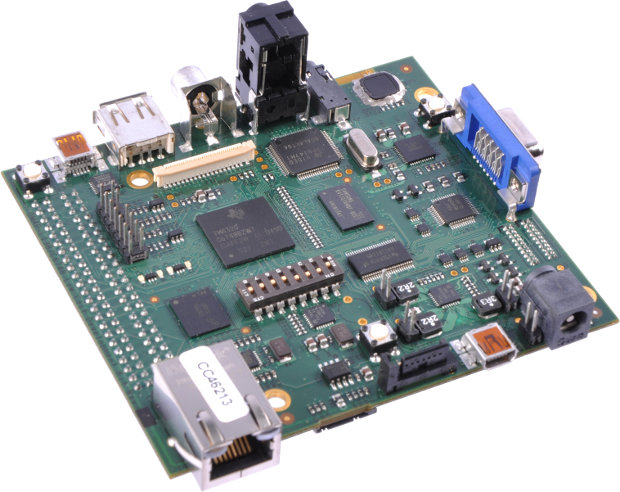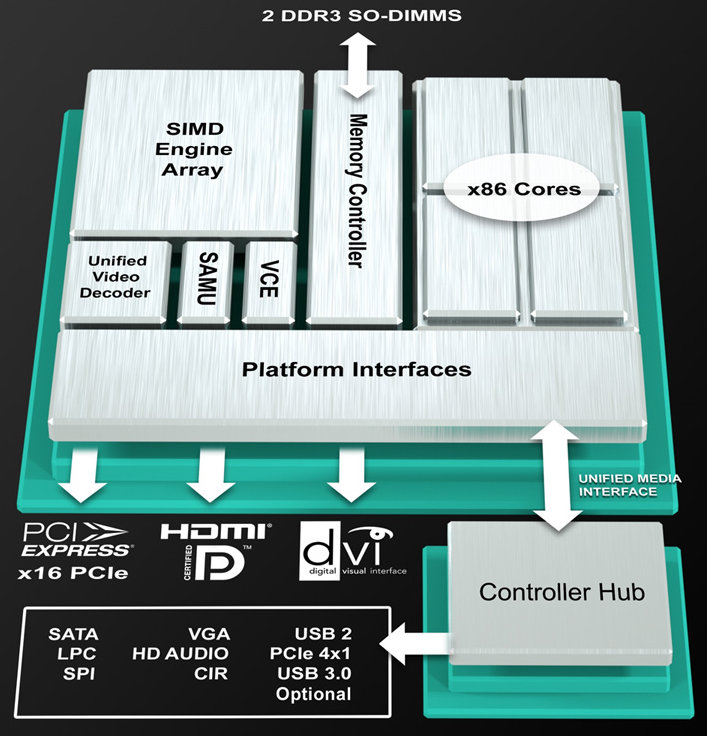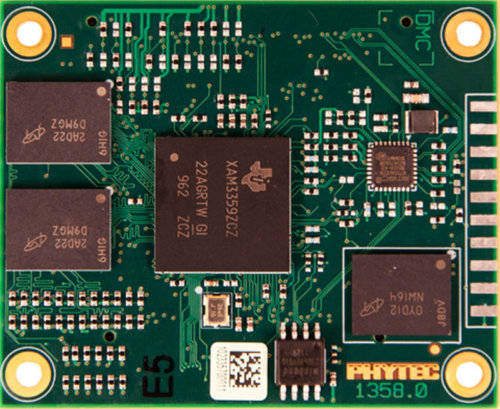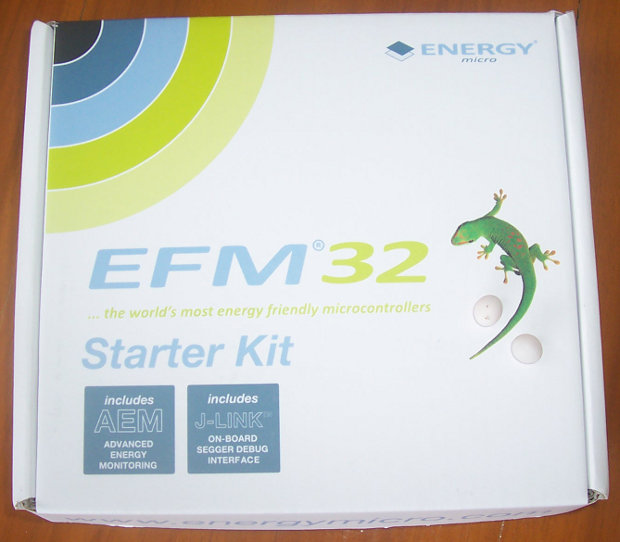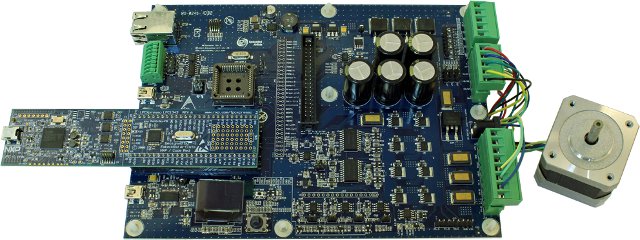Texas Instruments recently introduced the TMS320C6748 DSP development kit (LCDK) for real-time analytics applications such as fingerprint recognition and face detection, as well as other digital signal processing applications, such as audio and communications. The C6748 DSP development kit comes pre-loaded with TI C6748 SYS/BIOS Software Development Kit (SDK) which includes: SYS/BIOS real-time kernel C6748 StarterWare software package (lightweight, operating-system-independent software libraries and utilities) Sample apps for fingerprint recognition and face detection Code Generation Tools DSP core performance benchmarks that show the real-time processing power of TI’s C674x DSPs. The C6748 DSP development kit also includes Code Composer Studio IDE v5.1. Several standard interfaces for connectivity and storage are available in the board to allow audio, video and other signals. Expansion headers also allow developers to add display and user interface technology, such as camera boards and LCD screens. The board schematics and design files are supposedly available for download, […]
$3.45 Microchip PIC32 Development Platform Microstick II
MIPS and Microchip organize a promotion on a MIPS PIC32 MCU development Kit. The Microstick II delivers a development hardware platform for Microchips MIPS-based 32-bit microcontrollers. It’s USB-powered and includes an on-board debugger/programmer, a DUT socket for easy device swapping, a user LED and reset button. Key features: Integrated USB programmer / debugger – No external debugger required USB Powered – Ease of use, No external power required MPLAB support. DUT Socket – Flexible, Easy device replacement 0.025” Pin headers – Enables plug-in to Breadboard with room for jumper wires Easy access to all device signals for probing Small size – Smaller than a stick of gum at 20 x76mm – Easily Portable On board User LED and Reset Switch Free demo code Microstick II supports all 3.3V PIC24FJ, PIC24H, dsPIC33, and PIC32 SPDIP packaged devices which are included in the kit. Microkit II normally costs 34.95 USD, but is […]
AMD Launches AMD Embedded R-Series APU Platform
AMD has launched their AMD Embedded R-Series accelerated processing unit (APU) platform designed for mid- to high-end graphics-intensive applications such as digital signage, casino gaming, point-of-sale systems and kiosks, as well as parallel processing applications such as medical imaging and security/surveillance thanks to OpenCL and DirectCompute support. The AMD Embedded R-Series APU combines the “Piledriver” CPU architecture with an AMD Radeon 7000 Series GPU. There are 8 AMD R-Series APUs, 4 in PGA package and 4 in BGA package: R-464L – Quad Core APU @ 2.3/3.2 GHz with Radeon HD 7660G. TDP: 35W (PGA) R-460H – Quad Core APU @ 1.9/2.8 GHz with Radeon HD 7640G. TDP: 35W (PGA) R-272F – Dual Core APU @ 2.7/3.2 GHz with Radeon HD 7520G. TDP: 35W (PGA) R-268D – Dual Core APU @ 3.0/2.5 GHz with Radeon HD 7420G. TDP: 35W (PGA) R-460L – Quad Core APU @ 2.0/2.8 GHz with Radeon HD 7620G. […]
25 USD Hacker Friendly Electric Imp “WiFi-ises” Your Coffee Machine
Electric Imp is a device in an SD card form factor that aims at providing Wi-Fi connectivity to household appliances at low cost and bringing the Internet of Things (IoT) closer to reality. The Imp will also connect to a Cloud service handled by the company (which is also called Electric Imp). The device Wi-Fi connection can easily be configured using an iOS or Android smartphone thanks to BlinkUp, a patent-pending scheme supporting WEP, WPA and WPA2 encryption schemes as well as WPS setup. Electric Imp developers expect this device to save resources (e.g. electricity) by taking into account environmental conditions (e.g. occupancy, temperature..), improve security & safety and overall provide better monitoring and control of devices. For example, this could enable support services to remotely diagnose a device, and provide timely customer support. Here are the Electric Imp hardware specifications: ST Micro STM32 Cortex M3 MCU 802.11b/g/n WiFi 6 […]
Phytec phyCORE-AM335x System on Module (SOM) Based on TI Sitara AM335x
PHYTEC announced the phyCORE-AM335x System on Module (SOM) powered by Texas Instruments Sitara AM335x Cortex-A8 processor clocked at 720Mhz and PowerVR SGX530 GPU. This SoM targets industrial applications and supports standards such as EtherCAT, Ethernet/IP, PROFINET, PROFIBUS, POWERLINK, SERCOS-III and CANopen. Here are phyCORE-AM335x SOM specifications: TI’s Sitara AM335x ARM Cortex-A8 processors @ 720 MHz (AM3352, AM3354, AM3356, AM3357, AM3358 and AM3359) PowerVR SGX530 Graphics (AM3359, AM3358, AM3354 only) 512 MB DDR3, 512MB/1GB NAND, 8 MB SPI Flash, 32 KB EEPROM 6x UARTs, 3x I2C, 2x McASP, 2x SPI, 2x CAN 2x USB OTG 2x 10/100/1G Ethernet (Gigabit PHY on carrier board) 24 bpp TTL or LVDS 44 x 50 mm form factor -40 degrees to +85 degrees C temperature range Linux, Compact 7, Android The phyCORE-AM335x SOM will be available in a PHYTEC Rapid Development Kit (RDK) including: phyCore-AM335x SOM A carrier board Board support packages (BSP) Demo images […]
Energy Micro EFM32 Tiny Gecko (Cortex-M3) Starter Kit Unboxing
I’ve been lucky recently, after winning a TI Piccolo controlStick last month, I’ve just received Energy Micro EFM32 Starter Kit (EFM32-TG-STK3300) based on EFM32 Tiny Gecko MCU. This development board include: EFM32 Tiny Gecko Cortex-M3 MCU 8×20 LCD A light sensor A touch slider A battery compartment SEGGER J-Link mini USB port 2 Button + 1 reset button 1 User LEDs 2 expansion ports. Lots of through holes to access the different pins of the MCU Today, I’ll just show the content of the kit and next time, I’ll post more about the things I’ve done with it. Here’s the package of the EFM32 Starter Kit. The 2 gecko eggs were not included… Actually, those are house geckos eggs which are smaller than real geckos. We’ve got those here as well, but there are very shy, whereas house geckos just run around the walls and ceilings all day. Well, it’s […]
Atmel Unveils AVR XMEGA C, tinyAVR ATtiny1634 and AVR UC3 L3/D4 MCUs
Atmel announced 14 new Atmel AVR microcontrollers divided into 4 families: AVR XMEGA C, tinyAVR ATtiny1634, AVR UC3 L3 and AVR UC3 D4. Atmel AVR XMEGA C MCUs Atmel AVR XMEGA C MCUs are 8-/16-bit general-purpose MCUs with Full-Speed USB, 12-bit ADC, up to 384 KB flash and 32 KB SRAM. They can support Atmel QTouch Library for implementation of capacitive buttons, sliders and wheels functionality. The AVR XMEGA C MCUs consume 700nA in sleep mode with RTC. There 8 new XMEGA C MCUs which target consumer, industrial and home automation applications such as thermostats with display, building and climate control, utility meters with RF and ZigBee connectivity. The smallest XMEGA C MCU (ATxmega16C4), which comes in 44-pin package and has 16KB device, is the cheapest AVR XMEGA device with USB provided by Atmel. You can find further information on Atmel AVR XMEGA C page. Atmel tinyAVR ATtiny1634 MCU Atmel […]
Embedded Artists NXP LPCXpresso Motor Control Kit Promotion
Embedded Artist and NXP have jointly designed the LPCXpresso Motor Control Kit to easily get started with motor control prototyping. This platform is based on NXP LPCXpresso MCUs and can control BLDC (Brushless DC), BLAC (Brushless AC), stepper and dual brushed DC motors. This is not a new design (2010), but Embedded Artist and NXP are discounting their development kit by 50% for a limited period, which brings the price of the kit to 149 Euros, instead of 299 Euros. The kit includes: LPCXpresso Motor Control Board LPCXpresso LPC1114 Board (The “stick” on the left in the picture above) LPCXpresso Eclipse-based IDE and GNU compiler BLDC Motor with hall sensors 24V Power supply (60W) Here are the specifications of the Motor Control Board: Controller MCU • Socket for LPCXpresso LPC1114 and LPC1343 • Socket for LPCXpresso LPC176x • Socket for LPC1xxx in PLCC44 • Expansion connector for control by LPC1800/LPC4000/LPC2900 […]


